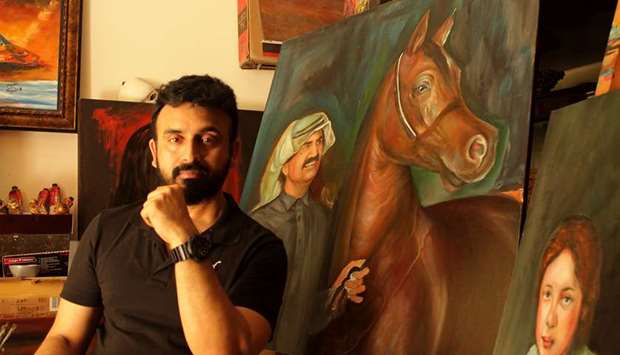Creative minds tend to be the most sensitive beings of society. They feel and express themselves in ways that are often different from other people in a community.
The unjust blockade of Qatar has also made a strong impact on the minds of many artists in the country. Community recently spoke to some artists from different backgrounds about how they felt during these challenging times.
Evgeniya Goncharova is a Russian artist based in Qatar. She asserts that Qatar has given her creative art a huge lift-up. The artist believes Qatar has never been weak and will never be one. “The unjustified blockade has actually made Qatar stronger than ever. The black magic seems to have turned against the magicians. The blockading countries have failed to weaken Qatar. Instead their action has made the country self-sufficient.’
The long-time resident of Qatar says the blockade has made the country more united. “The siege has made all who live in Qatar stand by the courageous leadership of the country. Honestly, the government did their very best to concentrate on the needs of people. They did an amazing job that made all of us truly feel that there is no blockade.”
Dr Sreekumar Padmanabhan, is an Inidan physician and artist. A resident of Qatar since 2007, he lauds the government for handling the issue of blockade in a positive way. “I can’t believe it has been three years. The way the country has handled the crisis is so much courageous and laudable that there has never been an impact on the lives of the residents. The wise leadership has handled the situation with dignity. The country was quick in recognising the opportunity offered by the siege. Qatar has proven to the rest of the world that a small country can stand on its own despite the challenge.
“The best outcome of this blockade is that the country has become more resilient and the people stand more united. This crisis has imparted a new feeling and sense of nationalism whereby each and every individual – whether he is a Qatari or non-Qatari – has joined hands to counter the challenge.”
Mala Waseem is a Canadian national of Pakistani origin. She said: “Being an artist, blockade impacted me personally as I felt being constrained for being a resident of Qatar. Blockade has made me exceptionally transformed and elevated my connection with Qatar. I have proudly witnessed our society being united in response to the siege.
“Qatar’s art circles have emerged into a powerful and ever-evolving structure. Local and resident artists now have access to countless opportunities through Qatar’s many visual art platforms. Peering at current art arena in Qatar, from the perspective of an artist, I must acknowledge that Qatar’s art landscape has become more vibrant, determined and established after the blockade.”
Mala acknowledges Qatar’s resilience and says: “Recently inaugurated, prestigious National Museum of Qatar is one of the great contributions to cultural arena. Museum of Islamic Art, Mathaf Arab Museum, Sheikh Faisal Museum, Mesherieb Museum, Katara Cultural village, Doha Fire Station have actively been engaging locals and resident artists despite the blockade. Even during the pandemic, Qatar continues to promote art through online collaborations. Virtual tours, online exhibitions, webinars, art interviews, and online art workshops are currently trending and have been adopted by art enthusiasts.”
Samah al-Lulu is a young Palestinian artist who has been born and brought up in Qatar. She thinks the blockade has made Qatar stronger and more known in the world. “I can see Qatar as the desert flower of GCC – Wardat Alsahra. Actually, the blockading countries have done wrong to themselves by severing the ties with Qatar. The country has not weltered under the pressure of continuous siege. The country has become the better version of itself by becoming more independent and free. The blockade has actually offered more positive effects than that of negative.
“We can see lots of local businesses were supported by the government. Lots of projects have been completed. Qatar still facing this challenge, and it is moving forward towards it goals.”

Dr Sreekumar Padmanabhan
